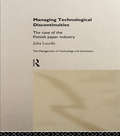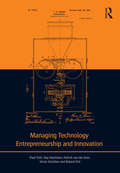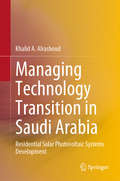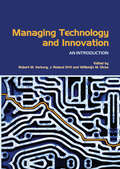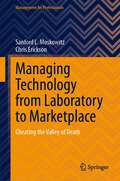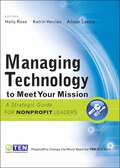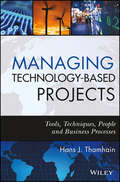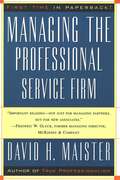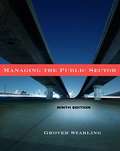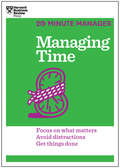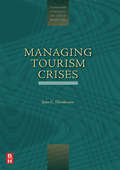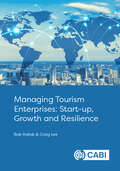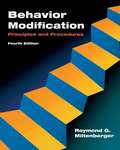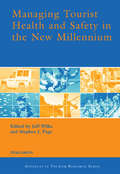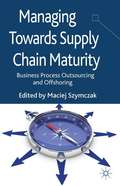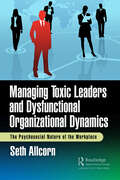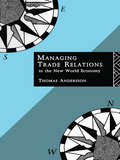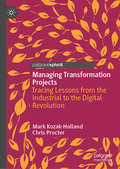- Table View
- List View
Managing Technological Discontinuities: The Case of the Finnish Paper Industry
by Juha LaurilaUsually firms introduce new technology in an incremental way, wisely seeking to minimise the adverse effects which business and employees might face. However, this is not always the case. Sometimes technological discontinuities occur when radically different technological systems and working practices are implemented, with the possibility of widespread disruption and conflict. This book looks at this topical issue through the experiences of the international giants of the Finnish paper industry - an industry at the cutting edge of fundamental technological innovation.
Managing Technology Entrepreneurship and Innovation
by J. Roland Ortt Paul Trott Dap Hartmann Patrick van der Duin Victor ScholtenManaging Technology Entrepreneurship and Innovation is the first textbook for non-business based entrepreneurship courses, focussed on students with a background in science and technology. Its comprehensive, rigorous and yet accessible approach originates from the authors’ considerable experience mentoring students as they turn their technological ideas into real-life business ventures. . The text is separated into three parts providing a roadmap for successful entrepreneurial projects: Part I focusses on how to create your venture, turning technology into businesses and how to link together entrepreneurship and innovation Part II shows you how to grow your venture and make it profitable, looking at the early development of academic spin-outs and how to adapt your technology to the customers’ needs. Part III takes you through the day-to-day running on your business; whether to adopt a contingency or contextual approach, how to develop new products and services and alternative options for growth. With a wide range of practical steps, lists of things to consider and guidelines on how to turn your technology based ideas into a successful business, this text will be essential for all non-business students who need to understand entrepreneurship, management and innovation. It will also prove a useful introduction to all Masters-level students taking these subjects in business schools.
Managing Technology Transition in Saudi Arabia: Residential Solar Photovoltaic Systems Development
by Khalid A. AlrashoudThis book presents a comprehensive overview of the adoption of small-scale residential solar photovoltaic systems (RSPSs) in Saudi Arabia. Focusing on the current technological development of RSPSs, it discusses elements of socio-technical governance theories and energy policy analysis. It also identifies the critical factors that affect Saudi residents’ decisions to adopt this new technology and analyzes broader energy systems on a state level by investigating factors that shape RSPSs integration policies. This multi-faceted, interdisciplinary book paves the way for an integrated transition management policy design model to stimulate RSPSs adoption rates. Given its scope, it is a valuable resource for readers seeking an in-depth and up-to-date integrated overview of the ever-expanding theoretical and quantitative fields of socio-technical transitions and the transition to sustainability.
Managing Technology and Innovation: An Introduction
by Robert Verburg J. Roland Ortt Willemijn M. DickeModern technology and innovation are vital to the success of all companies, be they hi-tech firms or companies seemingly unaffected by technology and innovation; whether established firms or business start-ups. This book focuses on understanding technology as a corporate resource, covering product development, design of systems and the managerial aspects of new and high technology. Topics investigated include: the internal organization of high technology firms the management of technology in society managing innovation dilemmas and strategies. The wide-ranging experience of the teachers and experts contributing to this book has resulted in an integrated, multi-disciplinary, textbook that provides an introductory overview to managing technology and innovation in the twenty-first century. This text is essential reading for students of business and engineering concerned with technology and innovation management.
Managing Technology from Laboratory to Marketplace: Cheating the Valley of Death (Management for Professionals)
by Sanford L. Moskowitz Chris EricksonManaging Technology from Laboratory to Marketplace outlines the process of getting innovative research out of the laboratory and into the market, a path which is often fraught with challenges. Many research projects meet their end as they attempt to cross this so-called “valley of death"--the period between the research phase of a project and the point when the new product or process emerging from that research becomes commercialized and enters the market. Firstly, this book aims to better understand how and why projects succeed in entering the market while others falter. Second, it uses these insights to guide researchers to optimize their chances of successfully making that transition, and finding their place in the market. The book primarily uses case studies from the field of advanced materials, but can be used by any researcher making the transition from laboratory to marketplace.
Managing Technology to Meet Your Mission: A Strategic Guide for Nonprofit Leaders
by Holly Ross Alison Levine Katrin VerclasManaging Technology to Meet Your Mission is a practical resource that will help nonprofit professionals make smart, strategic decisions about technology. The book shows how to effectively manage technology and offers practical advice for decision makers and staff alike who often have little or no experience with technology. With contributions from the top experts in the nonprofit technology field, this must-have guide addresses technology planning and people. It includes the tools you need to get the work done, and the knowledge that will help you communicate better, evaluate technology investments, raise money, and more. Written in nontechnical language the book covers a broad spectrum of topics including: Achieving IT Alignment with Your Mission Steve Heye, YMCA of the USA Managing Technology Change Dahna Goldstein, PhilanTech Measuring the Return on Investment of Technology Beth Kanter, trainer, blogger and consultant IT Planning and Prioritizing Peter Campbell, Earthjustice Finding and Keeping the Right PeopleJames L. Weinberg and Cassie Scarano, Commongood Careers Budgeting For and Funding Technology Scott McCallum and Keith R. Thode, Aidmatrix Foundation Introduction to IT and Systems Kevin Lo and Willow Cook, TechSoup Global Where Are Your Stakeholders, and What Are They Doing Online? Michael Cervino, Beaconfire Consulting Effective Online CommunicationsJohn Kenyon, nonprofit technology strategist Effective Online Fundraising Madeline Stanionis, Watershed The Future if IT in NonprofitsEdward Granger-Happ, Save the Children Praise for Managing Technology to Meet Your Mission "This invaluable guide for nonprofit leaders proves that nonprofit organizations can and should embrace technology, rather than being scared of or intimidated by it!" --Kristie Ferketich, senior strategist, Google Grants, Google Inc. "NTEN's Managing Technology to Meet Your Mission can help leaders craft a technology strategy that makes sense and builds ROI while also providing inspiration for their staff and supporters!" --Jonathon D. Colman, associate director and web evangelista, digital marketing, The Nature Conservancy "This book shows what NTEN does best: Bring together a wide range of voices to provide practical technology strategies and know-how to help nonprofits more efficiently and effectively move their own missions forward." --Marnie Webb, TechSoup Global
Managing Technology-Based Projects
by Hans J. ThamhainA GUIDE TO EFFECTIVE PROJECT MANAGEMENT IN TECHNOLOGY-BASED FIRMSUsed effectively, project management can increase a firm's market share, product quality, and customer satisfaction. Though technology-based companies place themselves at a competitive disadvantage if they neglect this strategic tool, many overlook project management's benefits because they see themselves as continuously adapting organizations. In reality, this role makes project management even more vital.Managing Technology-Based Projects imparts the latest approaches and tools essential to lead a successful technology-based project. It outlines the practical integration of project management with four key areas: strategic alignment of projects within the enterprise, the project management process and its organizational support system, invaluable tools and techniques, and the individual and group leadership within a project's organization. Complete with examples of industrial applications, the book includes:Methods for defining key performance indicators and assessing project management process effectivenessSuggestions for fine-tuning and continuous improvementPractical case scenarios, discussion topics, end-of-chapter reviews, and exercisesAttention to project management as it applies to a globalized businessNo one in a managerial role should be without Thamhain's expert advice. This guidebook is your road map to successfully incorporating enterprise project management into technology-based work.
Managing Television News: A Handbook for Ethical and Effective Producing (Routledge Communication Series)
by B. William Silcock Don Heider Mary T. RogusManaging Television News provides a practical introduction to the television news producer, one of the most significant and influential roles in a newscast. Recognizing the need for formal training in this key role, authors B. William Silcock, Don Heider, and Mary T. Rogus have combined their expertise and experience to shape this essential resource on the responsibilities, demands, and rewards of the news producer position. Their book provides a strategic approach to producing newscasts and serves as an in-depth guide to creating quality, audience-friendly newscasts working within the realistic limitations of most newsrooms. It helps the student and the professional producer sort through the various deadline-driven challenges of creating a 30-minute newscast. Filled with real-world examples and advice from news directors, producers, and anchors currently in the business, and photographs illustrating the varied perspectives in the position, Managing Television News provides critical skill sets to help resolve ethical dilemmas, as well as keen and fresh insights on how to win the ratings without compromising news quality. Career concerns are also addressed. This resource is a pioneering book for the professional television newsroom and the individual reader interested in starting or expanding a producing career. It is an excellent text for the college classroom, as its structure fits neatly into a semester schedule, and it is a must-have resource for both seasoned and novice producers, as well as students in broadcast news.
Managing The Professional Service Firm
by David H. MaisterFor the first time in paperback, international expert and consultant David Maister offers a brilliant and accessible guide to every management issue at play in professional firms. Professional firms differ from other business enterprises in two distinct ways: first, they provide highly customized services and thus cannot apply many of the management principles developed for product-based industries. Second, professional services are highly personalized, involving the skills of individuals. Such firms must therefore compete not only for clients but also for talented professionals. Drawing on more than ten years of research and consulting to these unique and creative companies, David Maister explores issues ranging from marketing and business development to multinational strategies, human resources policies to profit improvement, strategic planning to effective leadership. While these issues can be complex. Maister simplifies them by recognizing that "every professional service firm in the world, regardless of size, specific profession, or country of operation, has the same mission statement: outstanding service to clients, satisfying careers for its people, and financial success for its owners."
Managing The Professional Service Firm
by David H. MaisterProfessional service firms differ from other business enterprises in two distinct ways: first they provide highly customised services thus cannot apply many of the management principles developed for product-based industries. Second, professional services are highly personalised, involving the skills of individuals. Such firms must therefore compete not only for clients but also for talented professionals.Drawing on more than ten years of research and consulting to these unique and creative companies, David Maister explores issues ranging from marketing and business development to multinational strategies, human resources policies to profit improvement, strategic planning to effective leadership. While these issues can be complex, Maister simplifies them by recognising that 'every professional service firm in the world, regardless of size, specific profession, or country of operation, has the same mission statement: outstanding service to clients, satisfying careers for its people and financial success for its owners.'
Managing The Professional Service Firm
by David H. MaisterProfessional service firms differ from other business enterprises in two distinct ways: first they provide highly customised services thus cannot apply many of the management principles developed for product-based industries. Second, professional services are highly personalised, involving the skills of individuals. Such firms must therefore compete not only for clients but also for talented professionals. Drawing on more than ten years of research and consulting to these unique and creative companies, David Maister explores issues ranging from marketing and business development to multinational strategies, human resources policies to profit improvement, strategic planning to effective leadership. While these issues can be complex, Maister simplifies them by recognising that 'every professional service firm in the world, regardless of size, specific profession, or country of operation, has the same mission statement: outstanding service to clients, satisfying careers for its people and financial success for its owners.'
Managing The Professional Service Firm
by David H. MaisterProfessional service firms differ from other business enterprises in two distinct ways: first they provide highly customised services thus cannot apply many of the management principles developed for product-based industries. Second, professional services are highly personalised, involving the skills of individuals. Such firms must therefore compete not only for clients but also for talented professionals. Drawing on more than ten years of research and consulting to these unique and creative companies, David Maister explores issues ranging from marketing and business development to multinational strategies, human resources policies to profit improvement, strategic planning to effective leadership. While these issues can be complex, Maister simplifies them by recognising that 'every professional service firm in the world, regardless of size, specific profession, or country of operation, has the same mission statement: outstanding service to clients, satisfying careers for its people and financial success for its owners.'
Managing The Professional Service Firm
by David H. MaisterInternational expert and consultant David Maister offers a brilliant and accessible guide to every management issue at play in professional firms.Professional firms differ from other business enterprises in two distinct ways: first, they provide highly customized services and thus cannot apply many of the management principles developed for product-based industries. Second, professional services are highly personalized, involving the skills of individuals. Such firms must therefore compete not only for clients but also for talented professionals. Drawing on more than ten years of research and consulting to these unique and creative companies, David Maister explores issues ranging from marketing and business development to multinational strategies, human resources policies to profit improvement, strategic planning to effective leadership. While these issues can be complex, Maister simplifies them by recognizing that “every professional service firm in the world, regardless of size, specific profession, or country of operation, has the same mission statement: outstanding service to clients, satisfying careers for its people, and financial success for its owners.”
Managing The Public Sector, 9th Edition
by Grover StarlingCombining the most current public management thinking and research with examples of how public executives and organizations apply these ideas, MANAGING THE PUBLIC SECTOR is a comprehensive introduction to the field of public management. The Ninth Edition continues to engage the student's intellect by providing more than just the basic foundations of management; it places the application of management in the context of the public sector and tries to capture the excitement and challenge of the field.
Managing Time (20-Minute Manager Series)
by Harvard Business ReviewDoes it seem like you never have enough time to get everything done? Keeping on top of your tasks, deadlines, and work schedule can be daunting. Managing Time quickly walks you through the basics. You'll learn to: Assess how you spend your time now Prioritize your tasks Plan the right time to work on each one Avoid procrastination and interruptionsAbout HBR's 20-Minute Manager Series:Don't have much time? Get up to speed fast on the most essential business skills with HBR's 20-Minute Manager series. Whether you need a crash course or a brief refresher, each book in the series is a concise, practical primer that will help you brush up on a key management topic.Advice you can quickly read and apply, for ambitious professionals and aspiring executives-from the most trusted source in business. Also available as an ebook.
Managing Time (20-Minute Manager Series)
by Harvard Business ReviewBoost your productivity with these essential tips.About HBR's 20-Minute Manager Series:Don't have much time? Get up to speed fast on the most essential business skills with HBR's 20-Minute Manager series. Whether you need a crash course or a brief refresher, each book in the series is a concise, practical primer that will help you brush up on a key management topic.Advice you can quickly read and apply, for ambitious professionals and aspiring executives-from the most trusted source in business. Also available as an ebook.
Managing Time (20-Minute Manager Series)
by Harvard Business ReviewDoes it seem like you never have enough time to get everything done? Keeping on top of your tasks, deadlines, and work schedule can be daunting. Managing Time quickly walks you through the basics. You'll learn to: Assess how you spend your time now Prioritize your tasks Plan the right time to work on each one Avoid procrastination and interruptionsAbout HBR's 20-Minute Manager Series:Don't have much time? Get up to speed fast on the most essential business skills with HBR's 20-Minute Manager series. Whether you need a crash course or a brief refresher, each book in the series is a concise, practical primer that will help you brush up on a key management topic.Advice you can quickly read and apply, for ambitious professionals and aspiring executives-from the most trusted source in business. Also available as an ebook.
Managing Tourism Crises
by Joan C HendersonIn a world of increasing uncertainty it is vital that managers within the tourism industry are equipped with superior decision making skills and expertise necessary to deal with crisis conditions.Tourism Crises provides an effective synthesis of crisis management and tourism research with a solid theoretical foundation. It examines the principles and practices of crisis management within the context of tourism as a multi-sector industry. Using up to date international case studies, it tackles the following areas:· Political disturbance: the relationship between politics and tourism and political inspired tourism crises.· Social unrest: host-guest relations and tourists as targets of unrest· Economic instability: crises arising from fluctuating exchange rates and lack of investor confidence· Environmental conditions: natural disasters and health crises· Technological crises; transport accidents and crises arising from technical failure· Corporate crises. Human resource issues and questions of financeWith a user-friendly learning structure, each chapter will assess the presence of and tendency towards particular types of crisis, supported by a series of examples and cases, which describe organisational situations, challenges and responses. Approaches to managing crises will be assessed and appropriate tools and techniques of crisis management are explored, enabling readers to gain an insight into this critical aspect of tourism decision making and equipping them with the skills and expertise necessary to deal with crisis conditions.
Managing Tourism Enterprises: Start-up, Growth and Resilience
by Dr Rob Hallak Dr Craig LeeManaging Tourism Enterprises: Start-up, Growth and Resilience brings a new contribution to the literature on tourism management. It presents a comprehensive, educational text on the initiation, management, growth, performance and resilience of tourism enterprises in the age of digital disruption and global uncertainty. The book addresses the unique characteristics of tourism enterprises, how they are created, how they are managed, the factors that drive business performance, and how they must be innovative, resilient and adaptable in order to succeed. The content draws on empirical research, grey literature, government data and case studies to present theoretical and practical knowledge on the successful management of tourism enterprises and their role in tourism destinations. This book describes and includes essential business planning and teaching tools, such as: · The feasibility analysis, marketing plan, and strategic planning tools. · Lecture slides for each chapter. · Case studies with discussion questions. This is an essential book for undergraduate students completing 2nd and 3rd year courses on tourism management, with a focus on managing tourism enterprises; and postgraduate students undertaking courses specific to strategy and performance of tourism firms.
Managing Tourism and Hospitality Services: Theory and International Applications
by Gianna Moscardo Bruce Prideaux Eric LawsThe aim of this book is to enhance theoretical and practical understanding of quality management in tourism and hospitality. It provides a benchmark of current knowledge, and examines the range of research methods being applied to further develop tourism and hospitality service management research. It is hoped that this book will stimulate new research questions by highlighting tensions and challenges in the area.
Managing Tourist Health and Safety in the New Millennium (Advances In Tourism Research Ser.)
by Stephen J. Page Jeff WilksManaging Tourist Health is a seminal study which combines a range of state of the art reviews of the issues facing tourism managers and professionals in the fast growing area of tourist health and safety. An international range of contributors, each a specialist in their chosen field, have written papers for this book to explain many of the complex issues affecting tourists, the tourism industry and governments in ensuring tourism is viewed as a safe and enjoyable experience for all.The contributors have a wealth of interdisciplinary experience ranging from medicine, law, tourism research, safety science, ergonomics, management, consultancy among other cognate areas of study. Future research directions are examined in many of the chapters together with current state of the art knowledge in relation to key studies. The editors have worked in this area of research since the late 1980s and have accumulated a wide range of academic, professional and consultancy experience for governments and the private sector. The book extends this understanding through a multi-disciplinary perspective combining some of the leading researchers who have published in this area since the emergence of tourist health as a legitimate area of study in the 1970s.
Managing Towards Supply Chain Maturity
by Maciej SzymczakManaging Towards Supply Chain Maturity takes a view of the crucial issues involved in supply chain management, namely risk, information and social capital management. Over the last dozen or so years, the outsourcing and offshoring processes have grown in importance. It is now more and more the case that enterprises concentrate on their key competences while transferring operations or specific tasks to other countries. Modern supply chains are becoming supply networks; hence there is a need for conscious and concerted implementation of methods to manage risk, information and social capital. These issues are very important for the efficiency and competitiveness of supply chains and are discussed in detail. The discussion includes the results of research and introduces the concept of risk, information and social capital management that will ensure supply chain excellence and maturity according to the Poirier's model that has been taken as the point of reference for this study. From a managerial point of view this study can play a significant role in determining the best risk and information management practices in the context of the outsourcing and offshoring of business processes.
Managing Toxic Leaders and Dysfunctional Organizational Dynamics: The Psychosocial Nature of the Workplace
by Seth AllcornUnderstanding experience at work, especially in organizations that have toxic leaders and dysfunctional organizational dynamics, is a multidimensional undertaking that must include in-depth perspectives informed by psychosocial theory. This may be best accomplished by relying on complementary theories to account for what is found and experienced in our organizations and in particular a better understanding of why this is happening. "Why did she do that?" "Why did he say that?" "Why did a group react the way they did?" “Why,” is critical in terms of understanding organizational dynamics.Our lives at work in large complex and multidimensional organizations are saturated with experience, some of which is fulfilling, and some are of a darker nature that arises from the presence of toxic leaders and dysfunctional organizational dynamics. Understanding these toxicities and dysfunctions and their effect on organization members is approached by first raising their awareness at the beginning of the book before providing psychosocially informed insights that form a basis for understanding and organizational change in the following sections.This book explores these work-life dynamics by grounding them in concrete examples and then using complementary psychoanalytically informed perspectives to illuminate their underlying, often unconscious nature filling an important gap in management and organizational literature.
Managing Trade Relations in the New World Economy
by Thomas AnderssonManaging Trade Relations in the New World Economy analyses the implications of the new world economy for global trade. Thomas Andersson explores how manufactured exports have increased exponentially while the western economies have accrued massive current account deficits. Warning against the dangers of protectionism, he argues that the future of the world trading system, may depend upon the external policies of the EC.
Managing Transformation Projects: Tracing Lessons from the Industrial to the Digital Revolution
by Mark Kozak-Holland Chris ProcterThis book examines the management of three projects from the nineteenth century which led to substantial business transformation: the Stockton to Darlington Railway, the US Transcontinental Railroad and the Manchester Ship Canal. The lessons learned are of great relevance to contemporary project management, particularly those concerned with disruptive technology. The book addresses a wide range of project management topics associated with transformation. These include value management, sponsorship, governance, partnerships, opportunity management, project culture and morale, project complexity, uncertainty, prototyping and piloting, agility, innovation, risk and knowledge management.
